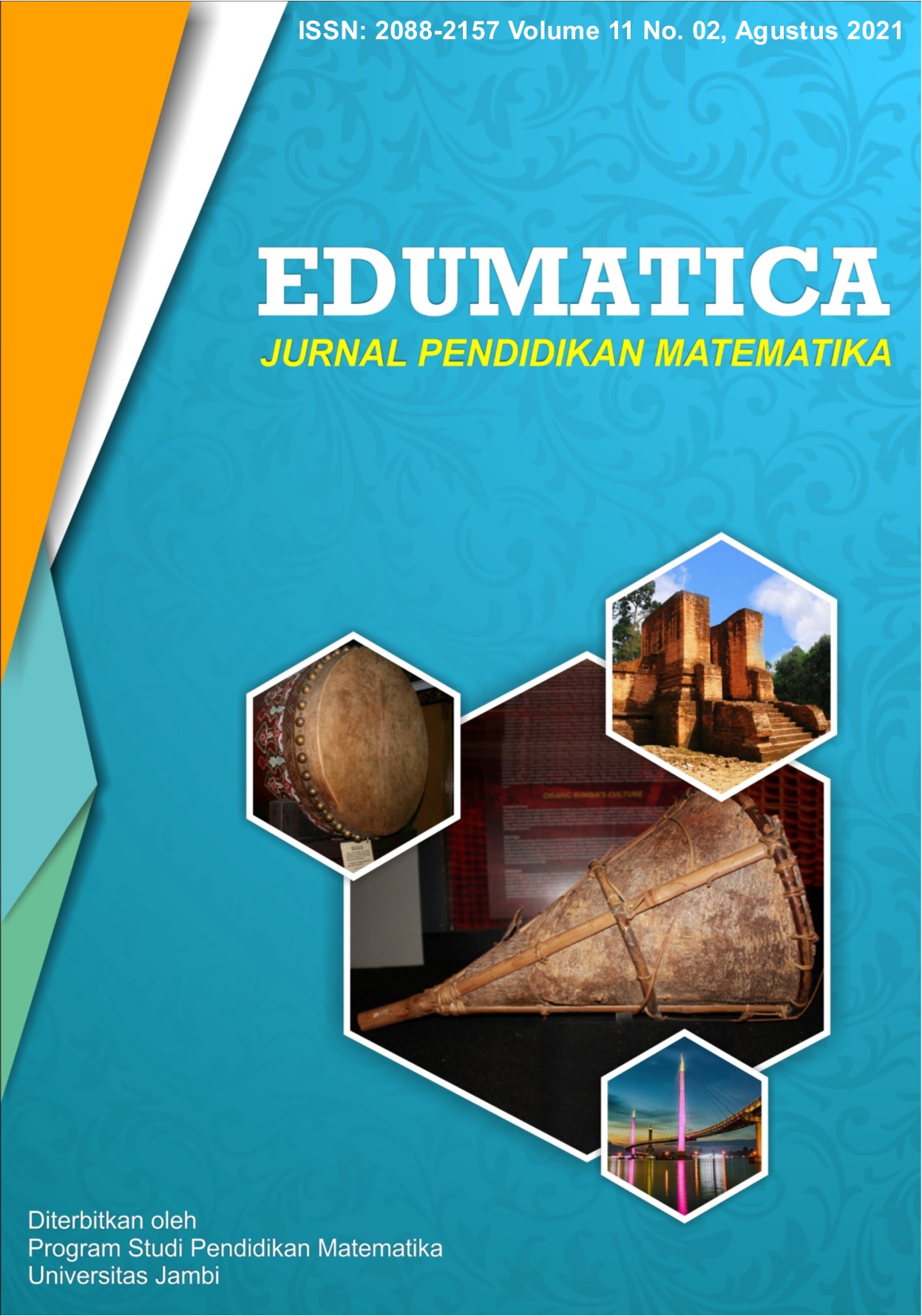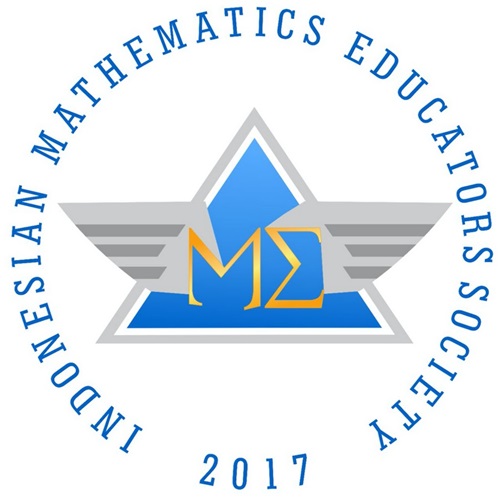Mathematical Problem Solving Ability in terms of Mathematical Disposition on the Application of Group Investigation (GI) Learning Models
DOI:
https://doi.org/10.22437/edumatica.v11i02.12205Keywords:
group investigation, mathematical disposition, problem solvingAbstract
This study aims to describe how students 'problem-solving abilities in terms of students' mathematical dispositions on the application of the group investigation (GI) learning model. The approach used is qualitative and quantitative with descriptive types. The research subjects were 29 MAN 1 Malang class X. The data collection technique used a closed questionnaire type Likert scale, observation sheet and test questions. The results showed that learning using the group investigation learning model on mathematics learning could have a positive impact on the affective domain of students, namely mathematical disposition. The giving of the first and second disposition questionnaires increased by an average of 3.31 in the good category. Students' mathematical problem solving abilities based on mathematical dispositions are obtained by students with high dispositions who are able to solve problems properly and correctly. Students of moderate disposition can understand the problem well and provide solutions but are lacking in the solving process. Meanwhile, students with low mathematical disposition have less problem solving skills.
Downloads
References
Adiasti, N., & Ekosoetjipto, B. (2016). The Implementation of Inquiry Learning with Setting Cooperative Model Type Group Investigation to Enhance Activity and Learning Outcomes for the Fifth Grade Students. Journal of Research & Method in Education (IOSR-JRME), 6(3), 46-50. https://doi.org/10.9790/7388-0603044650
Ambarita, R. A., Yunastiti, Y., & Indriayu, M. (2019). The Application of Group Investigation Based on Hands on Activities to Improve Learning Outcomes Based on Higher Order Thinking Skills of Students at SMA Negeri 2 Pematangsiantar. Budapest International Research and Critics in Linguistics and Education (BirLE) Journal, 2(2), 351-359. https://doi.org/10.33258/birle.v2i2.310
Arinda, Y., Wilujeng, I., & Kuswanto, H. (2019). The Application Group Investigation (GI) Learning Model assisted Phet to Facilitate Student Scientific Work Skills. International Journal of Educational Research Review, 4(2), 254-261. https://doi.org/10.24331/ijere.518069
Ayele, M. A. (2016). Students’ Beliefs About Mathematics Learning and Problem Solving: The Case of Grade Eleven Students in West Arsi Zone, Ethiopia. Education Journal, 5(4), 62. https://doi.org/10.11648/j.edu.20160504.14
Ayllon, F. M., Gomez, A. I., & Claver, B. J. (2016). Mathematical Thinking and Creativity through Mathematical Problem Posing and Solving. Propósitos y Representaciones, 4(1).
Cheng, S., She, H., & Huang, L. (2017). The Impact of Problem-Solving Instruction on Middle School Students’ Physical Science Learning: Interplays of Knowledge, Reasoning, and Problem Solving. EURASIA Journal of Mathematics, Science and Technology Education, 14(3), 731-743. https://doi.org/10.12973/ejmste/80902
Fitriani, H., Asy’ari, M., Zubaidah, S., & Mahanal, S. (2018). Critical Thinking Disposition of Prospective Science Teachers at IKIP Mataram, Indonesia. Journal of Physics: Conference Series, 1108(December), 012091. https://doi.org/10.1088/1742-6596/1108/1/012091
Hutajulu, M., Wijaya, T. T., & Hidayat, W. (2019). The Effect of Mathematical Disposition and Learning Motivation on Problem Solving: An Analysis. Infinity Journal, 8(2), 229. https://doi.org/10.22460/infinity.v8i2.p229-238
Indarti, D., Mardiyana, & Pramudya, I. (2018). Group Investigation with Scientific Approach in Mathematics Learning. Journal of Physics: Conference Series, 983(2), 012147. https://doi.org/10.1088/1742-6596/983/1/012147
Indrawati, R. (2017). Profil Pemecahan Masalah Matematika ditinjau dari Perbedaan Gaya Belajar. APOTEMA : Jurnal Program Studi Pendidikan Matematika, 3(2), 91-100. https://doi.org/10.31597/ja.v3i2.140
Indumathi, T., & Ramakrishnan, N. (2017). Development and Validation of a Tool on Cognitive Performance of High School Students. International Journal of Research -GRANTHAALAYAH, 5(8(SE)), 100-105. https://doi.org/10.29121/granthaalayah.v5.i8(SE).2017.2284
Inram, A., & Islamiati, N. (2018). An Analysis of Studentsr Mathematical Disposition using The Comic Media in Learning Geometry. Proceedings of the 5th International Conference on Community Development (AMCA 2018), 231, 212-215. Paris, France: Atlantis Press. https://doi.org/10.2991/amca-18.2018.58
Kannan, S., Sivapragasam, & Senthilkumar. (2016). A Study on Problem Solving Ability in Mathematics of IX Standard Students in Dindigul District. International Journal of Applied Research, 2(1), 797-799.
Kim, J. Y., Choi, D. S., Sung, C., & Park, J. Y. (2018). The Role of Problem Solving Ability on Innovative Behavior and Opportunity Recognition in University Students. Journal of Open Innovation: Technology, Market, and Complexity, 4(1), 4. https://doi.org/10.1186/s40852-018-0085-4
Kusmaryono, I., Suyitno, H., & Dwijanto, D. (2016). The Role of Mathematical Representation and Disposition in Improving Students’ Mathematical Power. AdMathEdu : Jurnal Ilmiah Pendidikan Matematika, Ilmu Matematika Dan Matematika Terapan, 6(1). https://doi.org/10.12928/admathedu.v6i1.4758
Kusmaryono, I., Suyityo, H., Dwijanto, & Dwidayati, N. (2018). Group Investigation Based Learning Improves Students’ Productive Disposition and Mathematical Power. International Journal of Education, Learning and Development, 6(5), 26-37.
La’ia, H. T., & Harefa, D. (2021). Hubungan Kemampuan Pemecahan Masalah Matematis dengan Kemampuan Komunikasi Matematik Siswa. Aksara: Jurnal Ilmu Pendidikan Nonformal, 7(2), 463. https://doi.org/10.37905/aksara.7.2.463-474.2021
Mite, Y., & Corebima, D. A. (2017). The Correlation Between Critical Thinking and the Learning Results of the Senior High School Students in Biology Learning Implementing Group Investigation (GI) Learning in Malang, Indonesia. Journal of Applied and Advanced Research, 2(2), 56. https://doi.org/10.21839/jaar.2017.v2i2.57
Nurmeidina, R., Lazwardi, A., & Ariyanti, I. (2020). The Student’s Disposition Mathematical Profile by using Probability Theory Module. International Journal on Emerging Mathematics Education, 4(2), 73. https://doi.org/10.12928/ijeme.v4i2.15625
Ozturk, T., & Guven, B. (2016). Evaluating Students’ Beliefs in Problem Solving Process: A Case Study. EURASIA Journal of Mathematics, Science and Technology Education, 12(3), 411-429. https://doi.org/10.12973/eurasia.2016.1208a
Razak, F. (2016). The Effect of Cooperative Learning on Mathematics Learning Outcomes Viewed from Students’ Learning Motivation. JRAMathEdu (Journal of Research and Advances in Mathematics Education), 1(1), 49-55. https://doi.org/10.23917/jramathedu.v1i1.1785
Rostika, D., & Junita, H. (2017). Peningkatan Kemampuan Pemecahan Masalah Siswa SD dalam Pembelajaran Matematika dengan Model Diskursus Multy Representation (DMR). EduHumaniora | Jurnal Pendidikan Dasar Kampus Cibiru, 9(1), 35. https://doi.org/10.17509/eh.v9i1.6176
Siniguian, T. M. (2017). Students Difficulty in Solving Mathematical Problems. International Journal of Advanced Research in Engineering and Applied Sciences, 6(2), 1-12.
Suhartono, Degeng, Suyitno, & Sulton. (2019). A Comparison Study: Effects of the Group Investigation Model and Direct Instruction Model toward Science Concept Understanding. Jurnal Pendidikan IPA Indonesia, 8(2), 185-192. https://doi.org/10.15294/jpii.v8i2.18135
Untoro, B. (2016). The Effect of Group Investigation and Learning Style on Students’ Writing of Analytical Exposition. IJEE (Indonesian Journal of English Education), 3(1), 29-45. https://doi.org/10.15408/ijee.v3i1.3445
Yang, Z., Wang, T., Zhu, M., & Qu, Z. (2017). How Did Mathematics Postgraduates Obtain Tacit Knowledge of Mathematical Problem Solving? American Journal of Education and Learning, 2(2), 121-131. https://doi.org/10.20448/804.2.2.121.131
Downloads
Published
How to Cite
Issue
Section
License
Copyright (c) 2021 Nur Islamiati, Dina Amalya Lapele, Beatrix Purnama Sari

This work is licensed under a Creative Commons Attribution-NonCommercial-ShareAlike 4.0 International License.






